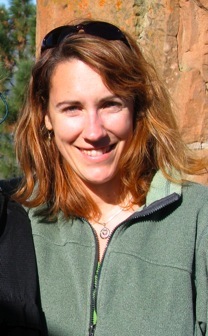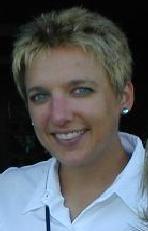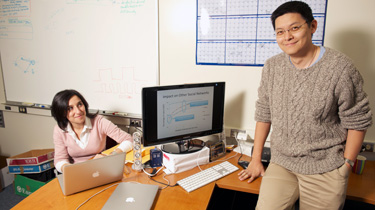 Elizabeth Belding, Professor, Computer Science
Elizabeth Belding, Professor, Computer Science
 Ben Zhao, Assistant Professor, Computer Science
Ben Zhao, Assistant Professor, Computer Science
Elizabeth Belding, Professor, Computer Science

- Hometown - Miami, FL
- Ph.D. - University of California, Santa Barbara
- Lab: Mobility Management and Networking (MOMENT) Lab
Awards
- Passive and Active Measurement (PAM) Conference Best Paper Award, 2007
- NSF Career Award: Mobile Network Support for Collaborative Environments, 2004-2009
- MIT Technology Review TR100 Award, 2002
Research Interests mobile and wireless networking: protocols, deployment/monitoring/performance analysis, network adaptability, multimedia support, future wireless networks, wireless networks for developing regions, bridging the digital divide
Tell Us About Your Research: My current work has two primary research emphases. The first is on developing wireless technology suitable for bridging the digital divide. We have partnerships with two organizations in Africa, through which we are developing and deploying technology that is well-suited for the constraints of these regions. The constraints include prioritizing voice and video communication (due to high illiteracy rates), and being highly energy efficient and conserving (due to lack of reliable energy sources). In particular, we are focusing on developing technology suitable for white spaces spectrum, which is spectrum typically assigned to primary users but that can be opportunistically grabbed for use when a primary user is not transmitting.
The second focus is on understanding the performance of deployed wireless network. We have done extensive monitoring of congested networks in conference scenarios, of the UCSB MeshNet (our own mesh network testbed deployed in our building), and most recently, of the access network in Macha, Zambia. This network in Zambia consists of two mesh networks and a number of long distance wireless links, all connected to the Internet through a satellite connection. We study a number of characteristics in each of these scenarios, such as how well the deployed protocols perform, what applications users utilize, the quality of service of the applications, and general characteristics of the network such as link and path stability. Based on our analysis, we often find problems and then develop and test solutions to improve the observed performance.
What do you find particularly rewarding about your work? I really like that I have been able to take my work in a humanitarian direction. One of the real benefits of computer science work is that you can have huge impact on society, as everyone can be impacted by computer usage. There are many documented and anecdotal stories about the revolutionary impact of Internet technology on communities in the developing world. Citizens that had never even placed a telephone call are now able to use the Internet to learn about different farming techniques, order farming supplies, order medical supplies such as AIDS medications, check weather patterns to influence farming strategies, and the list goes on. Enabling people to enrich the quality of their lives without being dependent on outside aid organizations is really important, and extremely rewarding.
On the academic side, I love being a professor for a million different reasons. Because I can define my own research agenda; because I get to teach students and watch them learn to love networking and then go off and get a job in networking; because I get to work with and mentor graduate students and watch them grow into accomplished researchers and embark on rewarding careers; because I get to travel the world going to conferences and meetings; because I get to work within the university to institute policies to improve the academic experience for students; the list goes on and on...
Tell Us The Steps You Took to Improve the Gender Balance in the Graduate Study Body: I think the key was being really proactive about recruiting and making sure no applications fell through the cracks. All the students we admit are top notch in their academic achievements. Proactive recruiting by faculty and current students made a big difference in educating admits about UCSB and all it has to offer. Once we had a critical mass, we created the Women in Computer Science (WiCS) graduate student group. This group has served as an important academic and social group for our female students. It has also worked to proactively recruit newly admitted female students, which enables us to keep our gender balance at 24% female graduate students. Finally, having some donor money through which we could offer extra financial support made a difference in recruiting top students as well.
How and Why Did you get interested in leading this effort? Just looking around any CS classroom or hallway, it is clear there is an issue with a gender and ethnicity imbalance in Computer Science. I have been interested in this topic for many years - my undergraduate honors thesis studied reasons behind the lack of women in the Computer Science field. Its a topic that impacts everyone. Particularly as technology has become such a critical part of society and of every person's life, its important that the people developing that technology come from all walks of life so that the technology is broadly appealing. Further, in a time when this is concern about out-sourcing and losing US competitiveness to other nations, it is essential that we tap into every potential resource we have here in the US, and that definitely means including women and minorities in large numbers!
Chandra Krintz, Associate Professor, Computer Science

- Hometown - Indiana
- Ph.D. - University of California, San Diego
- Lab: Research on Adaptive Compilation Environments (RACE Lab)
Awards
- 2010 IBM X10 Innovation Award recipient
- 2008-9 UCSB Academic Senate Distinguished Teaching Award
- 2008 CRA-W Anita Borg Early Career (BECA) Award
- 2008 Outstanding Faculty Member in Computer Science (co-award with Prof. R. Wolski)
- 2006 Microsoft Phoenix Award -- Feedback-directed optimization
- 2006 NSF CAREER Award (FY06-FY11) VIVA -- Vertically Integrated VirtualizAtion: Automatic, Full System, Specialization for High-End Computing
- 2005 Microsoft Phoenix Award -- Phase-aware remote profiling
Research Interests:Next-generation programming language implementation and use: compilers, runtimes, cross-language interoperation, use of languages for parallel and distributed computing. Emerging systems such as cloud computing and emerging languages such as Python, Ruby, X10, and Lua.
What do you find particularly rewarding about your work? Students. Its a privilege to work with, teach, mentor, and encourage our future computer scientists -- at the undergraduate and graduate level. Their potential is unbounded and the field has so much to offer them. Its exciting to be part of their lives and to help them learn and grow.
Tell Us About The curriculum redesign you led: The computer science faculty felt it was time to reflect on how and what we were teaching our students, especially early in the program (their first two years). This is a pivotal point in their careers where many wonder if the major choice they made was the right one. It is important that we teach solid fundamentals and inspire confidence and excitement in our students during this time, so that they are able to succeed, excel, and be excited about pursuing the more advanced upper division and then careers (industry or research) in computer science.
We had been teaching the same topics in the same ways for many years despite many advances in technological and pedagogical practices. In addition, undergraduate students have changed -- most are more comfortable with and have a wider range of experiences with computers, than those who came before them. Moreover, a key strength of our department is in the contributions to, experience with, and expertise in computer science systems. Given all of these observations, it was time for a change.
With the help of new faculty hires -- those with experience and expertise that focused on teaching computer science to undergraduates, we embarked on studying and strategizing about how we might exploit our strength in systems and improve our undergraduate lower division curriculum so that it is tightly coupled and fluid as well as hands-on and project driven. Most importantly it must improves student (i) preparation and confidence in the fundamentals, (ii) understanding of the big picture (why what they are learning is important and impacts the world around them), (iii) and engagement in the learning process. To enabled this we spent 1.5 years interviewing students and faculty at our university and those around the world, as well as industry leaders (those that ultimately hire our students).
We then designed and implemented a new lower division curriculum based on our findings that is focused on problem solving with computers, that builds understanding of how to do so from the ground (the underlying machine) up, that employs modern software engineering practices and tools, that incorporates successful pedagogical practices, that uses real problems and examples as part of lecture and hands-on labs, and that is systems focused. We believe that our new courses will engage and encourage students, show them the importance and potential of computer science in affecting the world around us, and will lay the ground work for enabling students build the skills they need to land satisfying, secure, and well-paying employment or research opportunities in the future. Moreover, our implementation includes a plan to continuously evaluate and assess the efficacy of our changes so that we can evolve them as we learn how better to improve student experience and student success in our department and thereafter.
How and Why Did you get interested in leading this effort? After teaching and working with undergraduates for 8 years, it became apparent to me and others that the student population had changed -- but that our curriculum in the lower division had not changed with them. Moreover, I spoke with many many students directly about their educational experience and found that there were many opportunities to improve the program (even in small ways) that would have significant positive impact on many individuals. I wanted to help make these changes.
UCSB and our department has a tremendous amount to offer students given our cross-disciplinary and practical approach to computer science research -- that, at the same time, is grounded in solid theoretical foundations. I wanted to play a role in helping to create an undergraduate program that takes advantage of this and to help get the word out that this is the place to come if you are interested in becoming a very successful and happy, next-generation computer scientist.
Professor Ben Zhao, Assistant Professor, Computer Science

- Hometown - Beijing, China
- Ph.D. - UC Berkeley, Computer Science, 2004
- Graduate Degree - UC Berkeley, Computer Science, 2000 (MS)
- Undergraduate Degree - Yale, Computer Science, 1997
UCSB Info:
- Courses: Operating Systems (CS170), Network Computing (CS176B), Advanced Topics in Networking (CS276), Networking for Multimedia (CS290F)
- Top Publications: "User Interactions in Social Networks and their Implications"; "Searching for Rare Objects using Index Replication"; "Cashmere: Resilient Anonymous Routing"
- Publications: http://www.cs.ucsb.edu/~ravenben/publications/index.html
- Honors and Awards - NSF CAREER Award, MIT Technology Review Top 35 Innovators, ComputerWorld Magazine Top 40 IT Innovator
- Lab/Group Name - Lab for Secure and Reliable Networking (CURRENT)
- Research Interests: My research interests lie in the boundaries between netw orking, security and privacy, operating systems, and algorithms. I also have he althy interests in wireless and mobile computing, programming languages and data bases.
Tell Us About Your Research:
My research focuses on issues of scalability, reliability, privacy and security in large-scale distributed systems, often through Internet measurement and experimental evaluation of new and existing protocols. Most recently, my group has examined how to improve privacy for users of online social networks, while also ex
ploring how to leverage implicit trust in social links to better secure Internet applications. Other projects include data management techniques for cloud-scale data processing, as well as design of experimental wireless systems such as vehicular networks and cognitive radio systems.
How and Why Did You Get Into Your Area of Research?: I get the most joy from doing research on topics that I personally care about. Whether it's privacy or online social networks, I enjoy working on problems that have significant impact on technophiles like myself.
What do you Find Particularly Rewarding about your Research?: Two things really draw me to research in an academic setting. First, I get such a thrill out of doing cutting edge research. There's that light bulb moment when you test out a cool new idea, and find that it solves a real problem. It's addictive. Doing research in an academic setting has the added benefit of interacting with and teaching students. Watching young students grow and learn is great. That moment when a student comes up with their first original idea is special. And that moment when I start to learn from them is even better.
More on Ben's Research
- Do you collaborate with industry? Other groups outside of UCSB?: I'm a big fan of collaboration, and actively collaborate with a number of university research groups from the US, China, and the UK, as well as industry research groups at Microsoft Research, Cisco, and HP Labs. My research topics often provide me with opportunities to talk to and work with my counterparts at companies like Facebook and Twitter. These interactions often shed light on real challenging issues in the field, and help to keep our projects current and relevant.
- Do you collaborate with other UCSB faculty and departments?: I also enjoy working with other faculty in and out of the CS department. Working with folks in security, theory, databases, I've learned that researchers often tackle similar problems in different fields. Similarly, experiences with folks in economics and communications have given me great external perspective on our projects, and solutions from those fields have proven highly effective at solving difficult problems in computer science.
- Why did you select UCSB?: When I was choosing a place to work, UCSB stood out as a place where there was a real emphasis on not only research excellence, but also a truly collaborative environment without politics. It's a place that I could easily see myself working and enjoying work until the day I retire.
Where Will Your Research Take You Next?
The best thing about the future is that it hasn't happened yet. I'm constantly surprised and challenged by game-changing breakthroughs in hardware and theory. In the short term, I'm interested in exploring challenges in secure and scalable data processing in clouds, and how they can support powerful mobile network applications.
Ben's Research Group and Thoughts on Working with Graduate Students
My lab is a very social, cordial environment featuring a healthy mix of students and post docs with diverse skills and backgrounds. We work hard, but also play hard together. Because I believe systems research is often strongest when guided with sound analysis, most projects in my lab are highly collaborative team projects combining expertise in systems, security, and analysis. Members of the lab include undergraduate researchers joining the BS/MS program, PhD students, post-doctoral scholars, and International visiting students. With backgrounds from China, India, Italy, and the US, it makes for a lively, exciting and highly productive atmosphere.